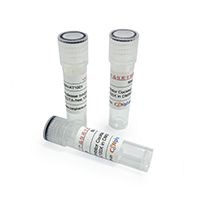描述
Tetramethylrhodamine Methyl Ester (TMRM) is a fluorescent lipophilic cation which can accumulate rapidly and reversibly in the mitochondria of living cells due to the negative Δψm of the mitochondria with respect to the cytosol.
保存条件
使用方法
1. Prepare a stock solution of TMRM at concentration of 600 µM in DMSO, protect from light, and store sealed at –20˚C.
2. Prepare a fresh working solution at concentration of 600 nM and 150 nM, respectively, in cell culture medium just before staining.
3. Aspirate the culture medium from cells grown on coverslips.
4. Immerse the cells in 600 nM TMRM for 20 min at 37˚C to load the cells with dye.
5. Aspirate the labeling medium, and immerse the cells in 150 nM TMRM to maintain the equilibrium distribution of the fluorophore.
6. Mount the coverslips onto Microscope Slides or in an appropriate chamber for observation.
7. Image the cells.{{Chazotte B. Labeling mitochondria with TMRM. Cold Spring Harb Protoc. 2011 Jul 1;2011(7):895-7. doi: 10.1101/pdb.prot5641. PMID: 21724814.|https://pubmed.ncbi.nlm.nih.gov/21724814/}}
For TMRM, λex ~548 nm; λem ~573 nm.
Maxima may vary somewhat depending on the concentration of the dye in the mitochondrion and especially in different
产品功能
Tetramethylrhodamine Methyl Ester (TMRM) is a fluorescent lipophilic cation which can accumulate rapidly and reversibly in the mitochondria of living cells due to the negative Δψm of the mitochondria with respect to the cytosol. It emits an orange-red fluorescence with a maximum at 575 nm When excited at 550 nm. On the contrary, mitochondrial depolarization results in a loss of dye from the mitochondrion and a decrease in mitochondrial fluorescence intensity. Thus, TMRM works as a membrane potential-dependent probe of a functioning mitochondrion.
参考文献

 400-920-2911
400-920-2911 sales@csnpharm.cn
sales@csnpharm.cn tech@csnpharm.cn
tech@csnpharm.cn